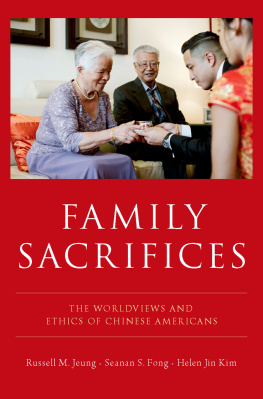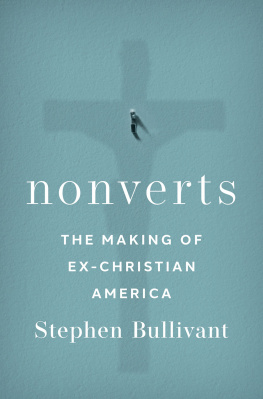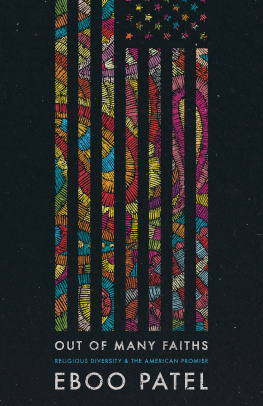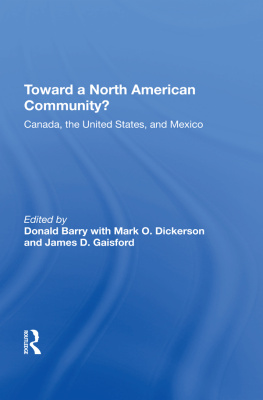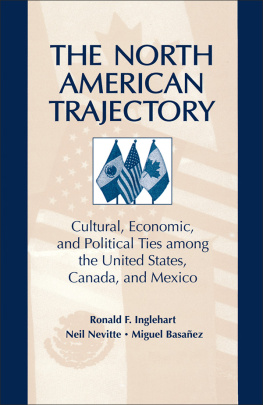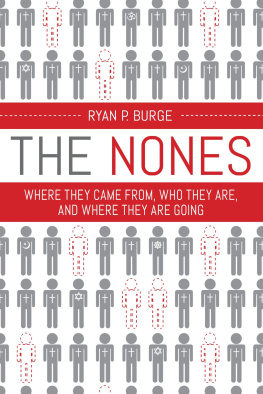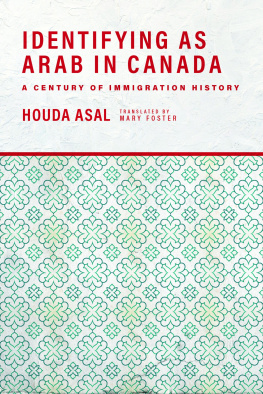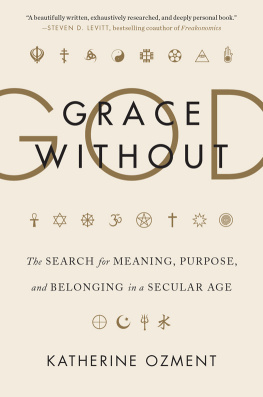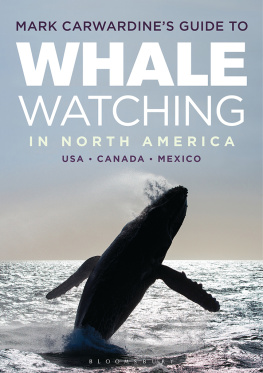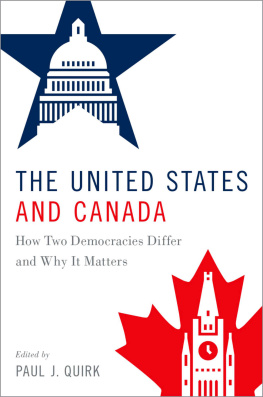Contents
Guide
Pagebreaks of the print version
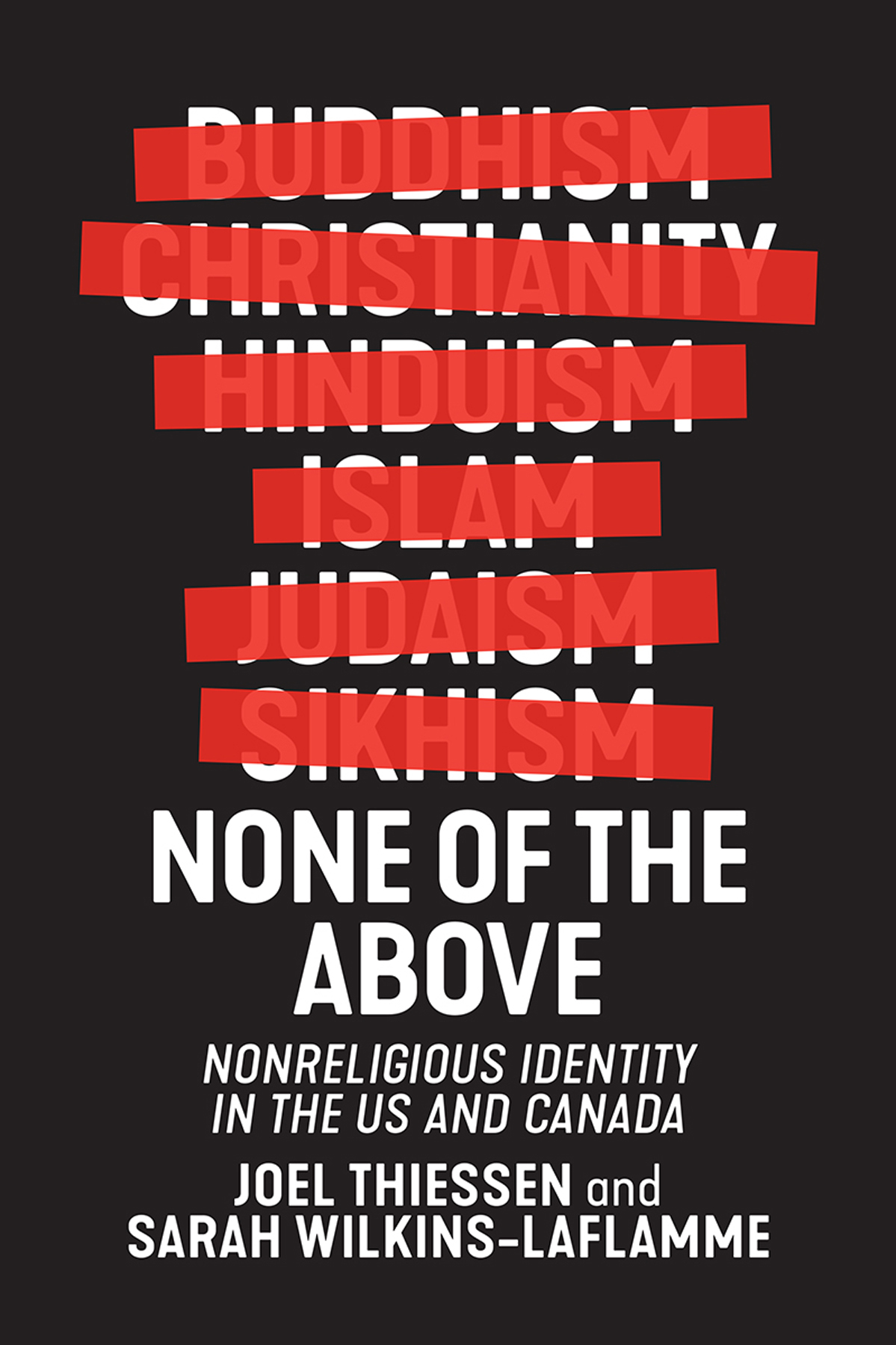
NONE OF THE ABOVE
SECULAR STUDIES
General Editor: Phil Zuckerman
Losing Our Religion: How Unaffiliated Parents Are Raising Their Children
Christel J. Manning
The Varieties of Nonreligious Experience: Atheism in American Culture
Jerome P. Baggett
None of the Above: Nonreligious Identity in the US and Canada
Joel Thiessen and Sarah Wilkins-Laflamme
None of the Above
Nonreligious Identity in the US and Canada
Joel Thiessen
Sarah Wilkins-Laflamme

NEW YORK UNIVERSITY PRESS
New York
NEW YORK UNIVERSITY PRESS
New York
www.nyupress.org
2020 by New York University
All rights reserved
References to Internet websites (URLs) were accurate at the time of writing. Neither the author nor New York University Press is responsible for URLs that may have expired or changed since the manuscript was prepared.
Library of Congress Cataloging-in-Publication Data
Names: Thiessen, Joel, 1981 author. | Wilkins-Laflamme, Sarah, 1987 author.
Title: None of the above : nonreligious identity in the US and Canada / Joel Thiessen, Sarah Wilkins-Laflamme.
Description: New York : New York University Press, [2020]. | Series: Secular studies | Includes bibliographical references and index.
Identifiers: LCCN 2019029129 | ISBN 9781479817399 (cloth) | ISBN 9781479860807 (paperback) | ISBN 9781479864225 (ebook) | ISBN 9781479813421 (ebook)
Subjects: LCSH: AtheismUnited States. | AtheismCanada. | IrreligionUnited States. | IrreligionCanada.
Classification: LCC BL2760 .T45 2020 | DDC 200.973dc23
LC record available at https://lccn.loc.gov/2019029129
New York University Press books are printed on acid-free paper, and their binding materials are chosen for strength and durability. We strive to use environmentally responsible suppliers and materials to the greatest extent possible in publishing our books.
Manufactured in the United States of America
10 9 8 7 6 5 4 3 2 1
Also available as an ebook
CONTENTS
Introduction
Nonreligious Identity in the US and Canada
Darlene, a former Evangelical and now a self-identified religious none in her sixties, agreed to meet in a nearby coffee shop. Reminiscing about her upbringing, she reflected, religion influenced every spare minute you had. This all-encompassing religious life troubled Darlene from an early age. She especially became critical of the perceived closed-mindedness of Evangelicals, saying, They kept very much to themselves could not see the good in something else. They couldnt see past what was in front of them. Later in the same interview with Darlene, she compared her current beliefs about God with those of her former Christian group: Mines not judgmental. Mine does not put huge demands on you. He allows you to experience other people, and love other people for what they are, not what they believe. She built on this idea of personal freedom, autonomy, and individualism throughout the interview, later celebrating the benefits of leaving her religious affiliation and involvement behind: I gain more freedom to think what I want, to work it out rather than being told, This is how you should think. When asked how confident she was in her status and worldview as a religious none, Darlene replied, How confident does a person have to be? I dont think I could be more confident.
Darlenes experience has become an increasingly common one in recent decades in both the United States and Canada. Religious nonesthose who say they do not belong to any religionare the fastest growing religious tradition in the United States and Canada, and much of the modern Western world. Nearly one-quarter of Canadian and one-fifth of American adults report that they have no religion in recent General Social Surveys, with an even larger one-third of teens and young adults in these countries claiming the same. Best estimates suggest that religious nones will continue to grow for the foreseeable future.
Canada and the United States are very similar in some respects, but as we will see, the proportion of religious nones grew earlier and more rapidly in Canada versus the United States (only recently have religious nones grown sharply in the United States). Some believe that currents in Canada may foreshadow what will happen in the United States. While as sociologists we avoid making predictions about the future, our comparative study in this book explores how a nonreligious identity intersects with several aspects of daily life in sometimes similar and sometimes differing ways in these two nations, offering insights that may help us to understand societal and political trends. This volume offers a look at the paths to becoming a religious none, including how the (non)religiosity of the surrounding region and society affects these biographic pathways; the diverse religious and secular attitudes and behaviors present among religious nones; the sociopolitical beliefs and practices of religious nones in areas such as gender, sexuality, the environment, poverty, and immigration; and the relationships between those who profess to have no religion and religious people and organizations. The knowledge base we provide in this book may help to explain social divides in both moral and political values, and how we can explain these divisions along religious/nonreligious lines.
As with all ways of identifying and understanding aspects of our social world and our daily lives, this concept of the religious none as someone who has no religion is a social construct in itself. It is a way of imbuing meaning to a reality that has become taken for granted by many in our society, a product of this time (the last half century or so) and this place (notably European and North American societies) because of a series of historical, cultural, and physical factors shaping the social environments in which we live. For the none phenomenon to become possible, there needs to be a context where religion is understood as distinct from other aspects of life (e.g., the economic, the political, the domestic), with distinct memberships, beliefs, and practicesa context where individuals can thus conceive of being without a religion. These conditions are now present for many in the United States and Canada, and in many traditionally Judeo-Christian societies across the Western world. Other scholars have explored some of the roots of this evolution in how religion and nonreligion have been understood throughout Judeo-Christian social history (see, for example, Berger 1967; Taylor 2007). In this book, however, we focus more on how individuals who say they have no religion define and use this aspect of their identity, and how it influences other aspects of current social life. Although the religious none is at its core a social construction, as with all such constructs it has become real in its consequences for many individuals and for our societies.
Some aspects of Darlenes life changed when she left her religion behind. Notably, she stopped taking part regularly in religious group activities. Yet, though she was now identifying as a religious none, Darlene acknowledged attending the occasional Christmas service when she visited her mother. However, she was quick to note, I dont enjoy it. She also watched the Gaither Vocal Band on television on occasion, for the harmony, not the lyrics, which she noted she had a hard time believing a lot of times. Darlenes reflections remind us of the Christian reference point that many religious nones have in the United States and Canada. Yet, it is also important to understand that, although some of the same religious behaviors may exist among the religiously affiliated and unaffiliated, individuals in these two groups attach different personal and social meanings and functions to those behaviorsmeanings and functions that we will explore in this book based on firsthand accounts from religious nones. Additionally, we argue in this book that, as individuals become further removed from organized religion and with many members of younger generations having little to no religious upbringing, not only do differences in personal and social meanings grow between the unaffiliated and affiliated, but so do differences in some behaviors as well.


